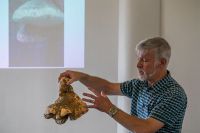Ngā Hekaheka o Aotearoa – Fungi of New Zealand educational booklet released to Māori immersion schools
A new educational booklet, aimed at teaching Māori ancestral knowledge about fungi (hekaheka) has been released to schools.
Manaaki Whenua researchers launched the bilingual teacher and student booklet “Ngā Hekaheka o Aotearoa,” at Auckland’s Te Kura Kaupapa Māori o Ngā Maungarongo.
It combines Manaaki Whenua research into Māori knowledge and uses of fungi in Aotearoa - where it was found fungi played an important role in food, medicine, fire-carrying, and tattooing for early Māori.
Lead researcher and co-author Dr Peter Buchanan initiated the project, in the hope of making this scientific knowledge more accessible to Māori students.
“It occurred to me that this knowledge is not European knowledge this is Māori knowledge, and do Māori know it? Is it in the Pūtaiao Māori science curriculum? Is there a way to get it there?”
“So I proposed it to MBIE for funding to reintroduce to Kura Kaupapa students, Māori knowledge that didn’t seem to have been maintained,” says Dr Buchanan.
Around 7,000 to 8,000 species of fungi have already been identified in New Zealand, but researchers expect there are thousands more.
Fungi play a crucial role in Aotearoa, a role Dr Buchanan says is often unrecognised.
“They help plants to grow and they help connect plants and they help and manage the whole decomposition and nutrient-cycling process. They’re also important for how people can use fungi. We use them for antibiotic medicine and food.”
Dr Georgina Stewart co-authored the resource, which was translated into Māori by Heeni Hacob.
“There will be knowledge within Māoridom that is not known outside, but what we tried to do is at least collate the knowledge which is in written form, and reintroduce it back to students so students can understand a little more about the importance of fungi,” says Dr Stewart.
108 Māori immersion schools around New Zealand will receive the student and teacher books.
The project was funded by MBIE’s Curious Minds programme.

Dr Peter Buchanan presenting on fungi


Fungi play a crucial role in Aotearoa

Around 7,000 to 8,000 species of fungi have already been identified in New Zealand.

Dr Georgina Stewart
